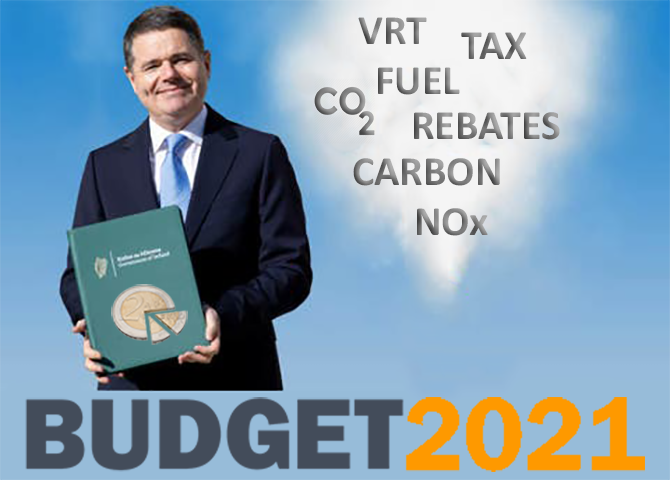Budget 2021 - The impact on motorists and the automotive industry

Budget 2021 certainly made efficient and electric vehicles more attractive but is this enough to make the regular motorist shift to Electric Vehicle technologies, after all, these new electric cars are not cheap and out of reach for most drivers.
The motor industry in Ireland has been anxiously awaiting the budget, particularly in relation to Vehicle Registration Tax (VRT). This tax is seen by most as an extremely regressive tax but it is a massive source of income for the State and so it would seem it is here to stay.
No other sector has been hit with such sweeping tax hikes. Many in the motoring industry describe budget 2021 as an ‘unjust attack on the sector and the thousands of livelihoods it supports’.
Budget 2021 confirms that driving your petrol and diesel car will be more expensive than ever. Just re-filling your petrol tank will likely cost you €1.30 more and €1.50 more for your diesel.
Added to the increase at the pumps, if your car is registered after 2008 and it is a less efficient diesel, it looks like the annual road tax will increase also. Cars which are older (pre-2008) will not see any increase in road tax.
These changes will adversely affect rural drivers and those who do not have decent access to public transport. Not that having access to public transport is anything as many in the cities will still opt for their own transport.
The VRT system will also see dramatic change with 20 different VRT bands which will range from 7% to 37%. They also intend to discontinue some major incentives currently available for electric cars.
A third motor tax table will be introduced on January 1 next for new cars registered to take account of the introduction of the WLTP emissions test. Brian Cooke, Director General of the Society of the Irish Motor Industry (SIMI) said:
“In the context of the current economic climate, Covid, Brexit and an already depressed new car market, the industry is disappointed with the increase in VRT announced in Budget 2021. Overall, the changes to the VRT system result in an average €1,000 increase on the price of a new family car. This will make the new car market even more challenging for next year, reducing demand and slowing down the replacement of the oldest cars in the national fleet with newer lower emitting cars, which in turn will make it more difficult to drive down emissions.”
VRT rebates for Plug-in Hybrid Electric Vehicles will be removed and the €5,000 VRT relief for fully electric vehicles will also be eliminated in time.
We are also being told by the Minister of Finance that any removal of relief and incentives will be compensated for within the new VRT system.
If you are someone who is fortunate enough to afford a brand new fully electric car, the removal of €10,000 in rebate and incentives is not good news.
The irony of all of this is that all these so-called green measures to eliminate carbon emissions may likely lead to an increase in carbon emissions rather than a reduction.
Brendan Walsh, a spokesman for ICCRA, the Irish Car Carbon Reduction Alliance, which represents the majority of new car dealers, stated that the Budget 2021 changes to VRT are anti-motorist, anti-rural and anti-climate. He went on to say that the changes in the VRT bands will mean price hikes for some of the most popular family cars.
- Irish Auto Industry is worth €17.75bn
- Carbon tax increase to raise €108m for the Exchequer in 2021
- Brexit has seriously affected the new car market
- Covid-19 has decimated the new car market
- Job loses in the retail car sector in Ireland, livelihoods devastated
- National effort to meet reduced CO2 and NOx emission targets
- National move to full vehicle electrification and zero emissions
- Retail price hikes on many popular family models
- Increase in annual Motor Tax on the 500,000 pre-2008 cars
- Increase in annual Motor Tax on the 1.6 million post-2008 cars
- Increase starting this year with mostly diesels over 141 g/km of CO2
- VRT system results in an average €1,000 increase on a new family car
- €7.50 increase in carbon tax
- Increase carbon tax by €7.50 every year up to 2029
- Increase carbon tax by €6.50 from 2030
- Current retail price of petrol and diesel immediate increase
- €27m made available for tackling climate change through carbon reduction schemes
- Allocation of €15m in 2021 to support up to 750 taxi and hackney drivers in scrapping their older vehicles and replacing them with zero-emission capable electric alternatives
- Roll-out of dedicated Electric Vehicle Taxi Recharging Points stepped up
- Up to €32,500 for those eligible for moving to a wheelchair accessible full electric vehicles
Author

Justin Kavanagh
Justin Kavanagh is a recognised leader
in automotive intelligence and vehicle
data supply to the entire motor industry.
He has almost 20 years experience in
building systems from the ground up.
As the Managing Director of Vehicle
Management System, he understands the
need and importance of trustworthy and
reliable vehicle history and advice to
both the trade and the public.
Follow me on LinkedIn